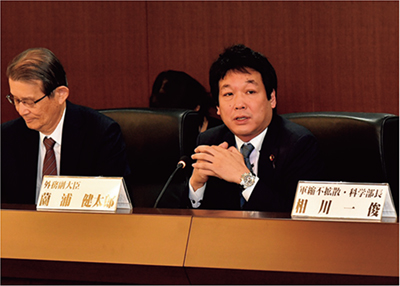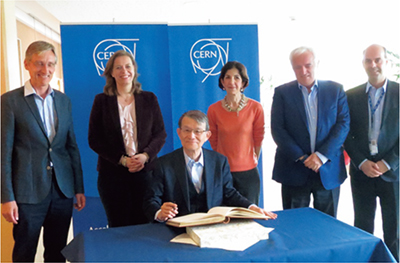Diplomatic Bluebook 2018
Chapter 3
Japan's Foreign Policy to Promote National and Global Interests
3 Science and Technology Diplomacy
Prof. Teruo Kishi (Science and Technology Advisor to the Minister for Foreign Affairs) supports the activities of the Foreign Minister from the perspective of science and technology, and provides advice on the utilization of science and technology in the planning and coordination of various foreign policies to the Minister and relevant divisions. He also takes part in public relations activities concerning Japan's science and technology diplomacy, while strengthening partnerships with Japanese and foreign stakeholders in the fields of science and technology.
In 2017, the Advisory Board for the Promotion of Science and Technology Diplomacy, chaired by the Science and Technology Advisor to the Minister for Foreign Affairs, as well as Study Group Meetings were held, and participants engaged in discussions about the utilization of science and technology in ways that contribute to the implementation of the SDGs and Arctic diplomacy.
 State Minister for Foreign Affairs Sonoura attending the fourth meeting of the Advisory Board for the Promotion of Science and Technology Diplomacy (April 27, Tokyo)
State Minister for Foreign Affairs Sonoura attending the fourth meeting of the Advisory Board for the Promotion of Science and Technology Diplomacy (April 27, Tokyo) Science and Technology Advisor to the Minister for Foreign Affairs Kishi visiting the European Organization for Nuclear Research (CERN) (September 14, Geneva, Switzerland)
Science and Technology Advisor to the Minister for Foreign Affairs Kishi visiting the European Organization for Nuclear Research (CERN) (September 14, Geneva, Switzerland)As a result of these discussions, the Advisory Board for the Promotion of Science and Technology Diplomacy drew up its Recommendation for the Future in May, aimed at the implementation of the SDGs, and this document was submitted by Science and Technology Advisor Kishi to Foreign Minister Fumio Kishida. The recommendation is based on the following four pillars: For Japan's diplomacy to (1) present a future vision of “change through innovation,” (2) “grasp and solve” the challenges by use of scientific data on a global scale, (3) “link” and “unite” across different sectors, regions and states, and (4) “foster” human resources who can support these initiatives. Based on these, it establishes that Japan's diplomacy should play an active leading role in the implementation of the SDGs.
In August, a working group chaired by Dr. Takashi Shiraishi, a member of the Advisory Board for the Promotion of Science and Technology Diplomacy, drew up and published a report entitled “Achievements and Future Directions of Science and Technology Advisor to the Minister for Foreign Affairs of Japan.” This report establishes that the building of a scientific advisory system for diplomacy through the Advisor creates a new unique character for Japan's diplomacy, and concludes that this Advisor system should continue into the future to promote Japan's initiatives in science and technology diplomacy.
Furthermore, the Advisor also implemented a project to publicize science and technology innovation through cooperation with the Cabinet Office and the Ministry of Foreign Affairs5 in various countries6, with the aim of enhancing Japan's capability of disseminating information about its prominent scientific and technological strength, and discussed the potential for future cooperation with the relevant organizations and researchers from the partner countries.
The Advisor has also attended various international conferences alongside with the science and technology advisors of other countries including the U.S., UK, and New Zealand, engaged in exchanges of opinions, and strived to build and strengthen networks. Together with the advisors of the other countries, he has also co-authored academic papers. In addition to these efforts, the Advisor widely publicizes Japan's efforts in science and technology diplomacy at various fora in Japan and abroad. To raise the level of knowledge within MOFA, science and technology diplomacy seminars are also held periodically.
Japan has concluded 32 science and technology cooperation agreements, and these are now in force with 46 countries and the EU7. Based on these agreements, it organizes regular joint committee meetings with these countries to engage in intergovernmental dialogue. In 2017, joint committee meetings were held with India, France, Italy, Slovenia, the EU, South Africa, and Bulgaria respectively. Attended by delegates from the relevant ministries and institutions, consultations were held on the current status of cooperation in diverse sectors, and on the future direction of cooperation, contributing to promoting science and technology exchange. The meeting with Bulgaria was the first to be held in 19 years.
With regard to multilateral cooperation, as a member of the Board of the International Science and Technology Center (ISTC) that supports research for peaceful purposes conducted by researchers on weapons of mass destruction from the former Soviet Union, Japan works together with the U.S. and the EU to provide support mainly to countries of Central Asia. Japan also participates in ITER projects.
- 5 Project (known as “SIP Caravan”) to introduce the SIP (Strategic Innovation Promotion Program), which is a new type of Japanese national project for science, technology and innovation, spearheaded by the Council for Science, Technology and Innovation (CSTI) as it exercises its headquarters function to accomplish its role in leading science, technology and innovation beyond the framework of government ministries and traditional disciplines by facilitating coordination among government, industry and academic entities under 11 themes, in order to lay the groundwork for future international cooperation, as well as for the international dissemination of Japan's research and development output, through cooperation with the Ministry of Foreign Affairs (diplomatic missions overseas).
- 6 Implemented in Indonesia in March 2017, in the Philippines and Thailand in June 2017, and in the Netherlands in September 2017.
- 7 The Japan-USSR Science and Technology Cooperation Agreement was succeeded by Kazakhstan, Kyrgyz Republic, Uzbekistan, Armenia, Georgia, Ukraine, Belarus, Moldova, Turkmenistan, and Tajikistan on different dates. The Japan-Czechoslovakia Science and Technology Cooperation Arrangement was succeeded by individual agreements with the Czech Republic and Slovakia in 1993. The Japan-Yugoslavia Science and Technology Cooperation Agreement was succeeded by individual agreements with Croatia, Slovenia, Macedonia, Serbia, Bosnia and Herzegovina, and Montenegro on different dates.
Michiharu Nakamura
Counsellor to the President, Japan Science and Technology Agency (JST)
I have been working in Japan's industrial sector for many years, and have been involved in science, technology, and innovation (STI) from the perspective of research and development. We could say that the role of monozukuri (production with a focus on craftsmanship) is to give form to scientific discoveries in a way that matches the needs of the real world, thereby contributing to making the world a better place.
The Sustainable Development Goals (SDGs), established by the United Nations for 2030, place its expectations in the utilization of STI for the realization of the SDGs, and put in place mechanisms to promote international cooperation. What should Japan, which has consistently asserted its goal of becoming a science- and technology-oriented nation, do to achieve this end? In this respect, I have accepted the role of coordinator with the responsibility of consolidating views to make the necessary recommendations from the Advisory Board for the Promotion of Science and Technology Diplomacy.
In order to draw up the recommendations, I engaged in discussions with actors who are engaged in a wide range of fields including the maritime sector, space, basic science, academia, and industry, on the approach for “STI for SDGs,” in view that the SDGs aim to resolve the diverse issues confronting humankind in a comprehensive and inclusive manner. In particular, we affirmed that Japan's initiatives towards realizing Society 5.0, as well as expanding and deepening international cooperation through Science and Technology Research Partnership for Sustainable Development (SATREPS) and other programs, can contribute to the sustainable development of the global community. Furthermore, we also reaffirmed that science and technology play an important role in Japan's diplomacy. The “Recommendation for the Future” completed in May 2017 as the outcome of these discussions, sets out four concrete actions in relation to the direction of “STI for SDGs.” These are: presenting the vision for a future society (Society 5.0), problem-solving through the application of data, partnership that transcends countries and sectors, and the development of human resources who will play a key role in “STI for SDGs.”
After that, I attended the second STI Forum held at the UN Headquarters in New York, together with the members who were involved in drawing up the recommendations. Bringing together 700 participants in the governmental, university, corporate, NGO, and other sectors of 100 countries, this two-day discussion focused on human resource development, collaboration with stakeholders, and the importance of the involvement of businesses, among other topics. These themes overlapped with the contents of our recommendation. The respective countries placed their expectations on Japan as a leader setting the precedence in efforts towards the realization of the SDGs, and anticipated the presentation of model cases by Japan.
 Second Multi-stakeholder Forum on Science, Technology and Innovation for the SDGs (STI Forum) (May 15 - 16, New York, U.S.)
Second Multi-stakeholder Forum on Science, Technology and Innovation for the SDGs (STI Forum) (May 15 - 16, New York, U.S.)The Recommendation for the Future described STI as a “bridging force.” Amidst our complex feelings of expectation and anxiety towards new technologies that are evolving rapidly in the present day, such as artificial intelligence and robots, instead of leaving technology to grow and develop on its own, I felt keenly the growing importance of taking the lead in the development of STI and making it a bridging force towards a human-centered society of the future, from the perspective of our vision on how human society should become 50 years or 100 years into the future.
We could say that the SDGs hold the key to identifying the issues that should be resolved by harnessing STI. Furthermore, promoting “social application” on a global scale into the future, with the aim of enabling research outcomes to take root and spread across the real world, can also bring us closer towards the realization of the SDGs.

